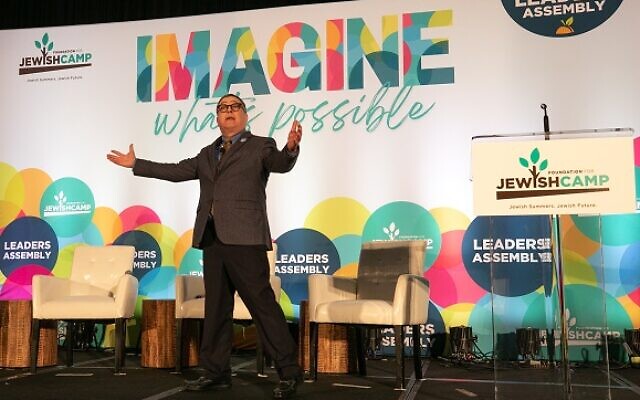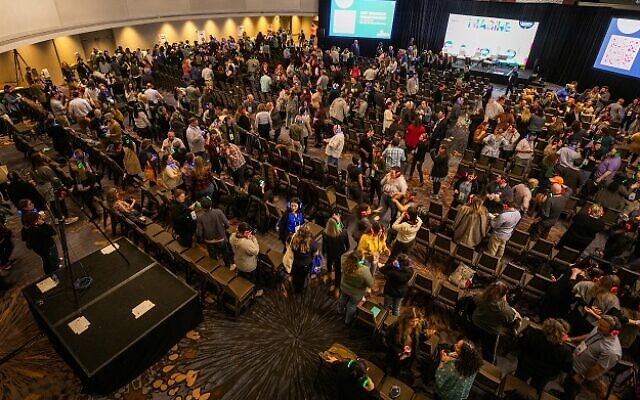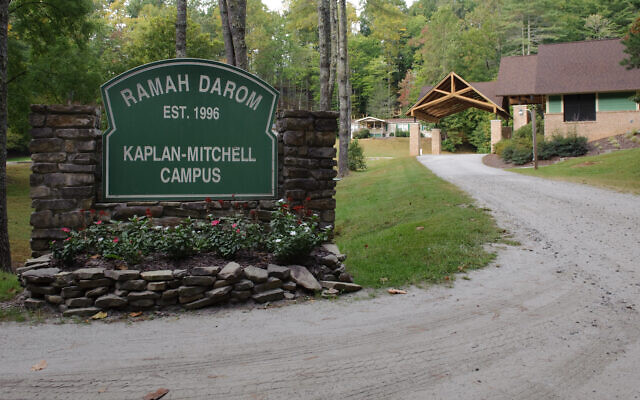Imagining the Future of Jewish Summer Camps
Atlanta conference brings hundreds to discuss the future of an enterprise labeled "Judaism with a smile."
Dave Schechter is a veteran journalist whose career includes writing and producing reports from Israel and elsewhere in the Middle East.
Jeremy Fingerman calls Jewish camps a form of “communal glue.”
“Summer camp provides a real joyous Jewish experience for all the participants and that’s a positive, joyous experience that really sinks into you hard and stays with you,” said Fingerman, CEO of the Foundation for Jewish Camp (FJC). “Camp is Judaism with a smile.”
Studies attest to the staying power of that experience. Children who attend Jewish overnight camps are more likely as adults to light Shabbat candles, attend synagogue, marry a Jewish spouse, visit Israel, donate to Jewish charities, and to demonstrate in other ways the importance of Judaism in their lives.
Maintaining that influence brought more than 825 camp directors, lay leaders, educators, funders and fundraisers, and vendors to Atlanta Dec. 4-6 for FJC’s biennial conference.
FJC initially expected 500 registrants. The larger than expected number demonstrates “the need of people to come together, the desire to be together, and the resilience and buoyancy of the field,” Fingerman said.
The conference theme — “Imagine What’s Possible” — is meant to look beyond the 2023 season.
“We see that camp is more important than it’s ever been to the campers, to their families, to their counselors,” said Fingerman. “The world needs more camp. Jewish camp, in particular, has been a real haven for folks” emerging from constraints necessitated by the COVID-19 pandemic.
COVID forced cancellation of the 2020 camp season. Camps that reopened in 2021, juggling state and local COVID rules, with some offering shorter seasons and limited activities. With a complete 2022 season in the books, “There’s enough momentum to say that we’re starting to dream again,” Fingerman said.
Several factors brought FJC to Atlanta. The non-profit, founded in 1998, established its third regional center in Atlanta about a year ago, joining those in Los Angeles and Chicago. The Southeast hub is headed by Bobby Harris, the former long-time director of Camp Coleman in Cleveland, Ga., operated by the Union for Reform Judaism.

Fingerman praised an “outstanding” partnership with the Jewish Federation of Greater Atlanta, citing JFGA’s “Jewish Camp Initiative,” established a decade ago to make summer camp more affordable. In addition, The Marcus Foundation “has been one of our long-time, most generous donors, funders and one of the leading foundations supporting Jewish camp in a broad sense,” he said.
Jewish camps are being challenged by increased operating expenses and tuition, while also focusing more on the mental, emotional, social, and spiritual health of campers and staff.
COVID-19 took a toll on every segment of the camp community, notably the children. “They lost community. For many campers, they say they live 10 months to get to those two months” at camp, Fingerman said. Camp provides what he termed “an aspirational arc,” in which campers look forward to new experiences each year.
Camp counselors may be the most important age group, Fingerman said. “They’re the heroes, they’re the example of what everybody wants to be like, they’re the cool role models.” The lost 2020 and limited 2021 seasons cost counselors opportunities “to learn how to lead, how to be a role model.”
“The parents also have suffered and are suffering,” Fingerman said. “Parents in 2021 were gracious and relieved that camps had reopened and were very appreciative.” He acknowledged generalizing in his observation that by the summer of 2022 some parents had returned to a “much less accommodating” stance.
Meanwhile, enrollment continued to rebound. In 2022, FJC listed 153 overnight camps, attended by 72,672 children, and 162 day camps, attended by 72,713 children. Fingerman estimated that 95 percent of children who attend Jewish overnight camps previously attended day camps, Jewish and otherwise.
Fingerman said that, compared with the year before, operating expenses in 2022 ran ahead of revenues. Meanwhile, the price tag to attend camp increased 7 percent in 2022, and an 8 percent increase is projected for 2023.
This is where Atlanta’s “Jewish Camp Initiative” comes into play. JFGA provided $1.04 million in scholarships and grants in fiscal 2022, with 80 percent benefiting campers attending regional overnight camps. Approximately 72 percent of the money went to need-based scholarships and 26 percent supported FJC’s “One Happy Camper” grants for first-time campers. The Federation program assisted 722 children to attend camp this past summer.

Jewish camps employ more than 38,000 full-time and seasonal staff. The staffing pipeline is being restocked after COVID-19 forced layoffs and some staffers found employment elsewhere. In 2021, the number of full-time professional staff at overnight camps dropped below pre-COVID levels and declined another 10 percent in 2022, Fingerman said.
The need to expand support for the mental and emotional health of campers and staff was cited by 82 percent of the overnight camps and 69 percent of the day camps in a FJC 2021 survey. An important source of aid has come through Yedid Nefesh (“beloved soul”) grants by The Marcus Foundation. Launched in 2019, Yedid Nefesh has made several million dollars available to fund services at 99 summer camps.
The importance of this work was reflected by the registration of 60 mental health professionals at the conference, Fingerman said, as well as numerous sessions focusing on related subjects, as well as issues of inclusion and diversity.
“The profession of camp director has become increasingly complex, because we’re dealing with so many types of things,” Harris said. “Camp is a reflection of our society. What shows up at camp happens the other 10 or 11 months of the year. These issues are really as present in our society in a very pronounced way.”
In five or 10 years, Jewish camp “will be much more developed as a year-round and life-long enterprise,” Fingerman said. “We can no longer rely on only the summer, because the school calendars are extending and actual free time in the summer is condensing.”
That future may include camp retreats for briefer periods, such as weekends or a couple of weeks; in-person camp programming in the Jewish communities themselves, and more online programming. “Year-round experiences only multiply the impact and magnify the impact of camp in the summer,” Fingerman said.
Harris participated in the search for a new director at Camp Barney Medintz, operated by the Marcus Jewish Community Center of Atlanta. Danny Herz, who has been director of the 6 Points Sports Academy, a Jewish camp in North Carolina, now moves to Camp Barney. During that process, Harris said that he was impressed by “the intense love for their camp” of the Camp Barney alumni.
Whatever their other points of Jewish identification, such as a synagogue or communal organization, Fingerman said, “An alumni of camp feels that they belong to their camp community. That’s the brand they belong to.”
- education and camp
- Local
- Dave Schechter
- Jeremy Fingerman
- Jewish Camps
- summer camp
- Foundation for Jewish Camp
- COVID
- Bobby Harris
- Camp Coleman
- Union for Reform Judaism
- jewish federation of greater atlanta
- Marcus Foundation
- Jewish Camp Initiative
- Yedid Nefesh
- Camp Barney Medintz
- Marcus Jewish Community Center of Atlanta
- Danny Herz
- 6 Points Sports Academy




comments